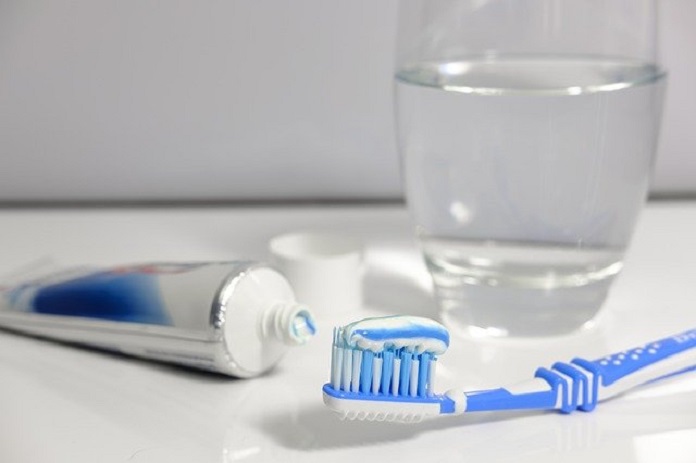Bleeding gums are common and often harmless. People with sensitive gums might notice bleeding simply after brushing or flossing their teeth. Usual causes are a lack of frequent cleaning (brushing twice a day), or using stiff, hard, or worn-out toothbrushes. Others include flossing too roughly or taking blood thinner medications (warfarin, aspirin, or ibuprofen). More serious underlying health conditions can also cause gums to bleed.
Warning signs of more seriously developing gum conditions include red, swollen, and tender gums that bleed easily. Painful chewing, loose or separating teeth that are pulling away from the gums can also signal a cause for concern. Constant bad breath or an altered taste in the mouth are further signs of a problem.
What causes bleeding gums?
Gingivitis
Gingivitis is a type of periodontal disease. It is an infection of the gum tissue holding the teeth in place. Poor brushing habits can lead to an accumulation of bacterial plaque on the teeth. Bacterial plaque buildup can irritate and inflame the gums, which result in bleeding. Normally, these bacteria help protect the mouth from other harmful organisms, but in some cases they cause tooth decay. If untreated, the problem can get worse and turn into periodontitis gum infections and possible tooth loss.
Nutritional deficiencies
Vitamin deficiencies, vitamin C or K, can result in unhealthy gums. Vitamin C is important for gum tissue growth and healing. It strengthens the teeth and other bones. In addition, vitamin K regulates blood clotting, and it is also good for the bones. A lack of either vitamin can cause swollen gums and bleeding.
Pregnancy
Pregnant women can experience gum bleeding because of hormonal changes (pregnancy gingivitis). Fluctuating hormones can make people more susceptible to plaque formation, inflammation, and bleeding. Hormones decrease the amount of saliva present, so more food ends up remaining on the teeth. The saliva may also turn more acidic, which can wear down teeth. Food preferences towards unhealthy sweets, or a lack of brushing from taste aversions to toothpaste can also provoke sore and swollen gums seen during pregnancy.
Diabetes
Bleeding gums can be a symptom of diabetes. High blood sugar results in more sugar in the saliva, around the teeth, and under the gums. This becomes a favourable environment for germs and plaque to grow. As seen in other conditions, the plaque irritates the gums, leads to gum disease, tooth decay, and potential tooth loss.
Leukemia
Leukemia, a blood cancer, can cause bleeding of the teeth and gums. Blood platelets are necessary to stop bleeding. In leukemia however, a person’s blood platelet count is low resulting in excessive bleeding in different parts of the body, including the gums. Other conditions involving blood platelet disorders include thrombocytopenia and hemophilia.
How to prevent bleeding gums
Good oral hygiene
Maintaining good oral health can prevent many conditions and symptoms of bleeding gums. Through medically reviewed studies, the American Dental Association has determined plaque buildup in the gum line to be the most significant cause of gum bleeds. To prevent plaque buildup, brush twice a day with fluoride toothpaste and follow a flossing routine. It is important to note that hard toothbrush bristles can cause swollen gums and irritation. It is recommended to brush your teeth with soft bristles instead. Replacing your toothbrush every three to four months, and regularly visiting a dentist can help maintain good dental care.
Healthy lifestyle
Adopting a healthy diet and lifestyle can help prevent the underlying illnesses of bleeding gums. Limiting sugar, eating more fruits and vegetables, and brushing your teeth as recommended will decrease the amount of plaque buildup that occurs. Relaxation is also important. Stress can increase inflammation within the body, which can make healthy gums bleed.
How to treat bleeding gums
Rinses
In some cases, home remedies can be effective in treating bleeding gums. Warm salt water rinses are often used to help alleviate the uncomfortable symptoms of swollen or tender gums. Antiseptic mouthwashes, which can be prescribed by dentists, can help decrease the amount of plaque that forms in the mouth.
Medical treatment
Underlying medical conditions that may be responsible for causing healthy gums to bleed can be treated through regular medical and dental care. Diabetic patients often receive antifungal medications in addition to monitoring their blood sugar.
When to talk to your dentist
It can be common to have healthy gums bleed. Talk to your dentist if redness, pain or gum bleeding is happening every day. Speaking with a healthcare professional is important if you notice any changes in your mouth, gums, or teeth. A dentist can help check for early-stage periodontal diseases or other problems. Physical exams and blood work can determine the underlying causes of bleeding and proper treatments can be prescribed.
Written by Melody Sayrany
References:
- Abbas, F., Velden, U., Hart, A. A. M., Moorer, W. R., Vroom, T. M., & Scholte, G. (1986). Bleeding/plaque ratio and the development of gingival inflammation. Journal of Clinical Periodontology, 13(8), 774–782. https://doi.org/10.1111/j.1600-051x.1986.tb00881.x
- Best Foods for Your Dental Health – American Dental Association. (n.d.). Mouth Healthy. https://www.mouthhealthy.org/en/nutrition/good-foods-slideshow
- Khairnar, M. S., Pawar, B., Marawar, P. P., & Mani, A. (2013). Evaluation of Calendula officinalis as an anti-plaque and anti-gingivitis agent. Journal of Indian Society of Periodontology, 17(6), 741. https://doi.org/10.4103/0972-124x.124491
- Newbrun, E. (1996). Indices to Measure Gingival Bleeding. Journal of Periodontology, 67(6), 555–561. https://doi.org/10.1902/jop.1996.67.6.555
- NHS website. (2020, December 8). Bleeding gums. Nhs.Uk. https://www.nhs.uk/pregnancy/related-conditions/common-symptoms/bleeding-gums/#:%7E:text=Some%20women%20get%20swollen%20and,pregnancy%20gingivitis%20or%20gum%20disease
- Peedikayil, F. C., Sreenivasan, P., & Narayanan, A. (2015). Effect of coconut oil in plaque related gingivitis – A preliminary report. Nigerian Medical Journal, 56(2), 143. https://doi.org/10.4103/0300-1652.153406
- Singh, A., & Purohit, B. (2011). Tooth brushing, oil pulling and tissue regeneration: A review of holistic approaches to oral health. Journal of Ayurveda and Integrative Medicine, 2(2), 64. https://doi.org/10.4103/0975-9476.82525
- Image by Bruno /Germany from Pixabay



